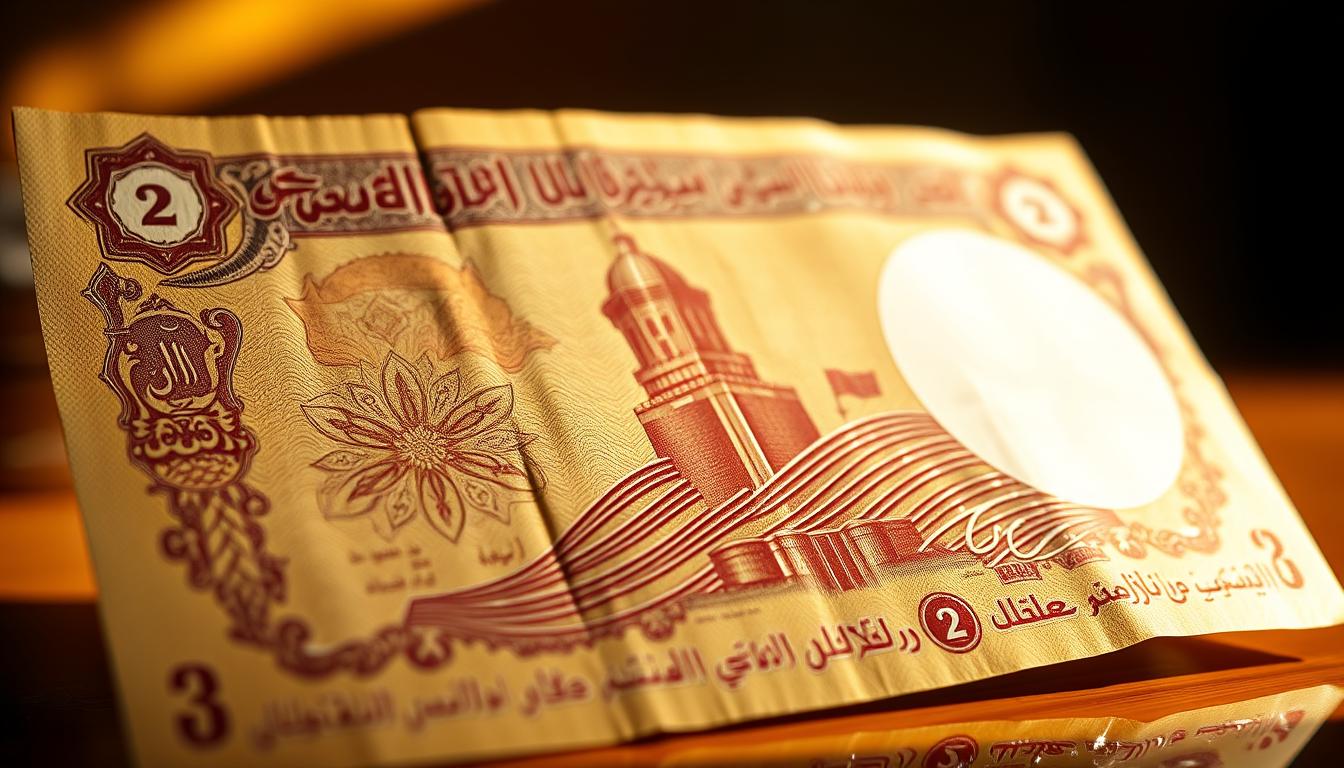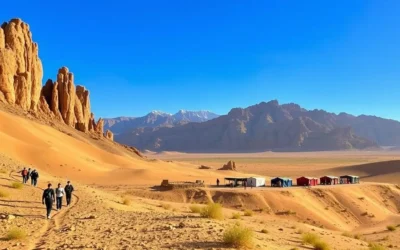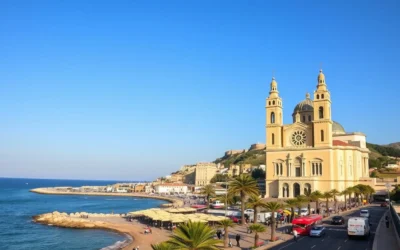✓ Accommodations✓ Flights✓ Rental Cars✓ Tours & Activities
Did you know that over 90% of transactions in Algeria are cash-based? This makes managing your money a top priority when visiting this vibrant country. Whether you’re exploring bustling markets or enjoying local cuisine, understanding the currency and payment systems is essential for a smooth trip.
In Algeria, the official Algerian dinar is the only accepted currency. While some hotels and tourist spots accept cards, cash remains king. This guide will help you navigate everything from exchange options to safety tips for handling money during your travel.
Planning ahead is crucial. From legal warnings about carrying cash to avoiding fraudulent practices, this guide ensures you’re well-prepared. Let’s dive into the essentials for managing your money and making the most of your trip to this fascinating country.
Preparing for Your Trip to Algeria
Planning your trip involves more than just packing your bags. Understanding local practices and preparing essential documents can make your journey smoother. Here’s what you need to know before you go.
First, familiarize yourself with the exchange rate. The official rate for the dinar is around 145 DA to 1 euro, but rates can vary. Using a reliable app to track the rate can help you budget better.
Next, ensure you have all necessary documents. Keep your passport, visa, and copies in a safe place. Declaring foreign currency upon arrival is mandatory, so be prepared to follow local procedures.
Mobile apps are your best friend for navigation and communication. Apps like Waze can help you get around, while local SIM cards with data plans are affordable and convenient.
Finally, always use authorized locations for currency exchange. Avoid airports and hotels, as they often charge higher fees. Here’s a quick comparison of exchange options:
| Location | Exchange Rate (1 EUR) | Notes |
|---|---|---|
| Banks | 145 DA | Official rate, reliable |
| Black Market | 238 DA | Risky, not recommended |
| Authorized Exchanges | 150 DA | Safe, slightly higher fees |
By following these steps, you’ll be well-prepared for your trip. Knowing the exchange rate, using helpful apps, and understanding local rules will ensure a stress-free experience.
Understanding Algeria’s Currency System
The Algerian dinar has a rich history tied to the country’s economic evolution. Introduced in 1964, it replaced the Algerian new franc and became the official currency. Today, it’s the backbone of all financial transactions, from bustling markets to local shops.
Algerian Dinar Facts
The dinar is issued in both coins and banknotes, with denominations ranging from 5 to 2,000 dinars. While coins are used for smaller purchases, banknotes are more common for larger transactions. Knowing these denominations helps you navigate daily spending with ease.
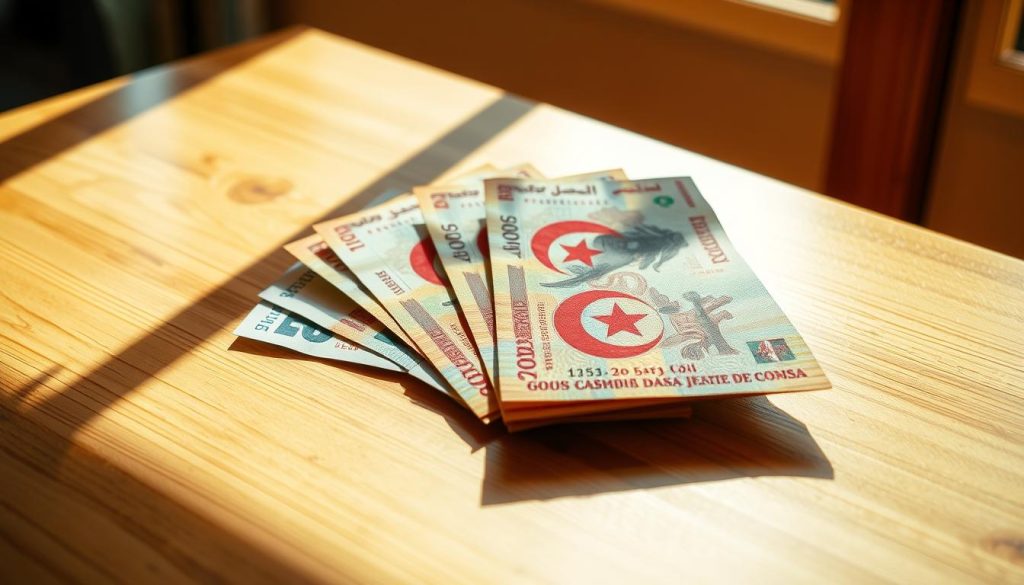
Banks play a crucial role in the currency system. Most major cities have reliable ATMs, but they’re less common in rural areas. If you’re a traveler, it’s wise to carry enough cash when venturing outside urban centers.
Currency Denomination Overview
Here’s a quick guide to the most common dinar denominations and their uses:
| Denomination | Common Use |
|---|---|
| 5 DA (coins) | Small purchases like snacks or bus fare |
| 100 DA (banknote) | Mid-range transactions, such as meals |
| 1,000 DA (banknote) | Larger expenses, like souvenirs or taxis |
Locals often guide travelers through the currency system. Their advice can save you time and help you avoid common pitfalls. For instance, they might recommend trusted banks or warn against black market exchanges.
“Always exchange money at authorized locations to avoid scams and get the best rates.”
Timing is another factor to consider. Exchange rates can vary between banks and street markets. While banks offer official rates, street markets might provide higher rates but come with risks. Planning your exchanges during bank hours ensures a smoother experience.
Navigating Payment Options in Algeria
Choosing the right payment method is crucial for a smooth travel experience. In Algeria, cash remains the most widely accepted form of payment. However, credit cards and travel money cards are also options in certain places. Understanding these choices helps you plan better and avoid unnecessary stress.
Cash is king in local markets, small shops, and rural areas. Always carry enough dinars for daily expenses. For larger transactions, some hotels and tourist spots accept credit cards. Ensure your card is from a reliable provider to avoid issues like declined transactions.
Travel money cards are another secure option. They allow you to lock in exchange rates and minimize fees. When selecting a card, choose a trusted provider to ensure safety and convenience. Always have a backup payment method in case one fails.
Visa requirements and border regulations can impact your payment strategy. Declare any foreign currency exceeding €10,000 upon entry. This ensures compliance with local laws and avoids penalties. Keep your visa and other documents handy for smooth transactions.
Be cautious of unauthorized exchange offices and black markets. They may offer higher rates but come with significant risks. Stick to authorized locations for currency exchange to ensure safety and reliability. Here’s a quick comparison of payment options:
| Payment Method | Pros | Cons |
|---|---|---|
| Cash | Widely accepted, no fees | Risk of theft, limited security |
| Credit Cards | Convenient for larger expenses | Not accepted everywhere, fees apply |
| Travel Money Cards | Secure, fixed exchange rates | Limited acceptance, setup required |
By following these tips, you can navigate payment options with confidence. Prioritize safety, choose reliable methods, and stay informed about local regulations. This ensures a hassle-free experience while exploring the country.
Managing Cash, ATMs, and Banks in Algeria
Managing your finances while traveling can make or break your experience. In this section, we’ll explore how to handle cash, use ATMs, and interact with banks safely. These tips will help you avoid common pitfalls and ensure a smooth journey.
Finding Reliable ATMs
ATMs are a convenient way to access cash, but not all are reliable. Stick to machines located inside banks or well-lit, busy areas. Avoid standalone ATMs in remote locations, as they may be more prone to skimming devices.
Timing is also important. Withdraw cash during daylight hours when banks are open. This ensures you can seek help if the machine malfunctions. Always check for suspicious devices attached to the ATM before inserting your card.
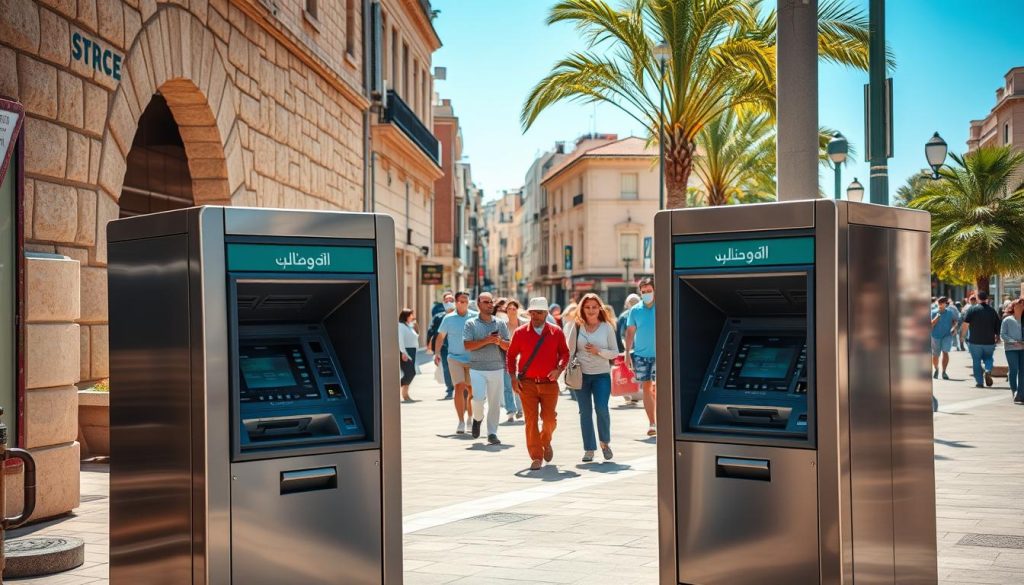
- Use ATMs inside banks or secure locations.
- Withdraw during daylight hours.
- Check for skimming devices before use.
Using Banks Securely
Banks are the safest option for currency exchange and large transactions. Always visit during business hours and bring your passport for identification. Be aware of potential fees for services like withdrawals or transfers.
Carry emergency cash for unexpected situations, especially when traveling to rural areas. This ensures you’re prepared if ATMs or banks are unavailable. Keep your cash in a secure, hidden location to avoid theft.
“Always carry a mix of payment methods to stay prepared for any situation.”
Here’s a comparison of banking options and their features:
| Option | Pros | Cons |
|---|---|---|
| Bank ATMs | Secure, reliable | May have withdrawal limits |
| Currency Exchange | Official rates, safe | Higher fees |
| Emergency Cash | No reliance on ATMs | Risk of theft |
By following these strategies, you can manage your cash and banking needs with confidence. Stay informed, prioritize safety, and enjoy your trip without financial stress.
Essential Money Management Tips for Travelers
Staying on top of your finances while traveling ensures a stress-free and enjoyable experience. Whether you’re exploring bustling cities or remote areas, managing your money wisely is key. Here’s how to budget effectively and handle emergencies with confidence.
Budgeting for Your Trip
Start by setting a daily spending limit. Track your expenses using a budgeting app or a simple notebook. This helps you stay within your limits and avoid overspending. Use a mix of cash and digital payments to manage your funds efficiently.
Digital financial networks like mobile banking apps are great tools. They allow you to monitor your account in real-time and make secure transactions. Always ensure your device is protected with a strong password and two-factor authentication.
Credit cards and prepaid travel cards are excellent options. They protect your primary account from fraud and offer fixed exchange rates. Choose a card with no foreign transaction fees to save on costs.
- Set a daily budget and stick to it.
- Use mobile banking apps for secure transactions.
- Opt for credit or prepaid cards to safeguard your account.
Handling Emergencies
Unexpected situations can arise, so it’s crucial to be prepared. Carry emergency cash in a secure location. This ensures you’re covered if ATMs or digital networks are unavailable.
Keep a backup payment method, such as a second credit card or a prepaid card. This minimizes the risk of being stranded without funds. Notify your bank of your travel plans to avoid card declines due to suspicious activity.
“Always have a backup plan for emergencies. It’s better to be over-prepared than caught off guard.”
Monitor your account regularly using secure apps. Look for unauthorized transactions and report them immediately. This helps protect your finances and ensures peace of mind during your trip.
By following these tips, you can manage your money effectively and enjoy your journey without financial stress. Stay informed, plan ahead, and prioritize safety.
How to Safely Exchange Money in Algeria
Currency exchange can be tricky, but with the right information, you can avoid common pitfalls. Ensuring your money is exchanged safely is a key part of any trip. In Algeria, using authorized locations and avoiding the black market are essential steps to protect your funds.
Authorized Exchange Locations
Always use banks or authorized currency exchange offices for your transactions. These locations offer fair rates and are regulated, ensuring your payment is secure. Major cities like Algiers have reliable options, but in rural areas, it’s best to plan ahead.
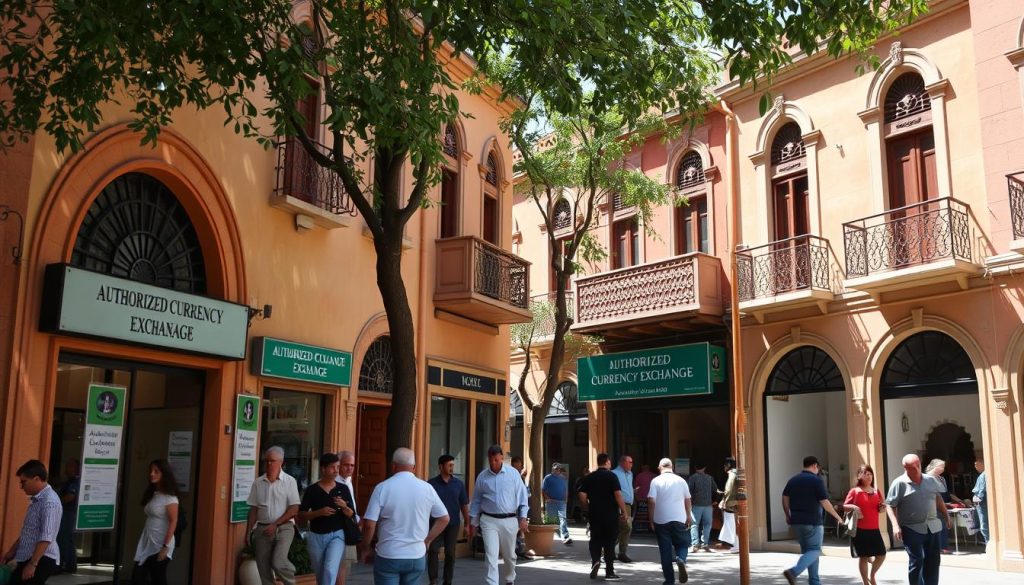
| Location | Exchange Rate (1 EUR) | Notes |
|---|---|---|
| Banks | 145 DA | Official rate, reliable |
| Authorized Exchanges | 150 DA | Safe, slightly higher fees |
| Hotels | 160 DA | Convenient but expensive |
Avoiding Black Market Risks
Street exchanges may offer higher rates, but they come with significant risks. The black market is illegal in Algeria, and using it can lead to scams or legal issues. Stick to authorized locations to ensure your exchange is safe and legitimate.
Here are some tips to verify the legitimacy of an exchange office:
- Check for official signage and licenses.
- Ask for a receipt or transaction record.
- Avoid locations that pressure you into quick decisions.
“Using authorized exchanges protects your money and ensures compliance with local laws.”
For added security, consider using travel money cards. They lock in exchange rates and minimize fees, making them a convenient option for travelers. By following these tips, you can manage your funds safely and enjoy a stress-free trip.
Algeria: Ultimate Travelers Guide to Currencies & Payments
Travel money cards are a smart way to manage your funds while exploring new destinations. They offer convenience, security, and competitive exchange rates, making them an excellent alternative to cash or traditional credit cards. Whether you’re shopping in local markets or dining at restaurants, these cards simplify your transactions.
Why Choose Travel Money Cards?
These cards work with multi-currency accounts, allowing you to convert your money into dzd or other currencies at competitive rates. Providers like Wise, Chime, Monzo, and Netspend offer features such as low fees, free ATM withdrawals, and compatibility with mobile wallets like Apple Pay. This makes them a versatile way to handle your finances.
Ordering a travel money card is simple. Most providers deliver within 7 to 21 days, so plan ahead. Once you receive your card, activate it and load funds before your trip. This ensures you’re ready to go as soon as you arrive.
Secure Spending Practices
Using these cards safely is essential. Always make sure your card settings are updated and alerts activated. This helps you monitor transactions in real-time and detect any unauthorized activity. Here’s a quick comparison of popular travel money cards:
| Card | Features | Trustpilot Score |
|---|---|---|
| Wise | 40+ currencies, mid-market rates | 4.2/5 |
| Chime | No foreign transaction fees | 2.5/5 |
| Monzo | No ATM withdrawal fees | 4/5 |
| Netspend | Varies by card, some no monthly fees | 4.2/5 |
By following these tips, you can enjoy a hassle-free way to manage your money. Travel money cards not only save you time but also provide peace of mind during your trip. Always make sure to carry a backup payment method for added security.
“Travel money cards are a reliable way to handle your finances, offering convenience and competitive rates.”
With the right card and secure practices, you can focus on enjoying your journey without worrying about financial stress. Plan ahead, choose wisely, and make sure your funds are always protected.
Smart Travel Tips for Using Payment Apps and Networks
Staying connected and managing your money on the go has never been easier with modern payment apps and navigation tools. These tools not only simplify your transactions but also help you stay organized and secure while traveling. Here’s how to make the most of them.
Navigating Waze and Mobile Banking
Apps like Waze are invaluable for finding your way around unfamiliar areas. Use it to locate nearby banks, ATMs, or currency exchange offices. This saves time and reduces the cost of unnecessary detours. Pair it with mobile banking apps to monitor your account and track spending in real-time.

Mobile banking apps offer features like transaction alerts and budget tracking. Set up notifications to stay informed about your spending. This helps you avoid overspending and ensures you’re always aware of your account balance.
Planning Expenses in Advance
Planning your expenses in advance is key to avoiding unexpected costs. Use budgeting apps to set daily limits and track your spending. This keeps you on track and helps you allocate funds for essentials like meals, transportation, and souvenirs.
Here are some tips for effective expense planning:
- Set a daily budget and stick to it.
- Use apps to track spending and receive alerts.
- Plan for emergencies by setting aside a small fund.
Secure and Efficient Transactions
Digital payment networks offer convenience and security. Use your smartphone for contactless payments or to transfer funds. Regularly review your app settings to ensure they’re up-to-date and secure. Enable two-factor authentication for added protection.
“Using payment apps and navigation tools not only saves time but also ensures a smoother travel experience.”
By following these tips, you can manage your finances effectively and enjoy a stress-free trip. Stay connected, plan ahead, and prioritize security to make the most of your journey.
Dealing with Currency Regulations and Legal Concerns
Understanding local currency regulations is essential for a smooth and stress-free trip. Failure to comply with these rules can lead to fines, legal issues, or even arrest. This section will help you navigate the legal landscape and ensure you stay on the right side of the law.
Understanding Declaration Requirements
When entering or exiting the country, you must declare any foreign currency exceeding €10,000. This rule applies to both cash and other monetary instruments. Failure to declare can result in penalties, including confiscation of funds or legal action.
Always carry the necessary documentation, such as your passport and a detailed record of your currency. This helps authorities verify your declarations and ensures a hassle-free process. If you’re unsure about the requirements, consult a reliable guide or local embassy for clarification.
Local Legal Tips
Local laws can be strict, especially regarding currency exchange. Avoid using the black market, as it’s illegal and can lead to severe consequences. Stick to authorized banks or exchange offices to ensure your transactions are legal and secure.
Photographing certain areas or currency can also be restricted. Always ask for permission before taking pictures to avoid misunderstandings. If you find yourself in an emergency, contact your embassy or consulate for assistance.
Here’s a quick comparison of exchange prices and their legal implications:
| Location | Exchange Rate (1 EUR) | Legal Status |
|---|---|---|
| Official Banks | 145 DA | Legal, regulated |
| Street Markets | 238 DA | Illegal, risky |
By following these tips, you can avoid legal issues and ensure a smooth trip. Always prioritize compliance with local laws and use authorized services for currency exchange. This not only protects your funds but also keeps you safe during your travels.
“Staying informed about local regulations is the best way to avoid legal troubles and enjoy your trip.”
Exploring Travel Money Cards for a Hassle-free Experience
Travel money cards are a game-changer for managing your finances abroad. They offer security, convenience, and competitive exchange rates, making them an excellent alternative to carrying cash. Whether you’re shopping in local markets or dining at restaurants, these cards simplify your transactions and keep your funds safe.
Comparing Card Options
When choosing a travel money card, it’s important to compare features, fees, and benefits. Here’s a quick overview of popular options:
| Card | Features | Trustpilot Score |
|---|---|---|
| Wise | 40+ currencies, mid-market rates | 4.2/5 |
| Chime | No foreign transaction fees | 2.5/5 |
| Monzo | No ATM withdrawal fees | 4/5 |
| Netspend | Varies by card, some no monthly fees | 4.2/5 |
Each card has unique advantages. For example, Wise supports spending in over 50 currencies, while Monzo offers free ATM withdrawals. Consider your travel style and spending habits when making a choice.
Travel Card Advantages
Travel money cards provide several benefits that make them a smart choice for international trips. First, they offer security by protecting your primary account from fraud. If your card is lost or stolen, you can quickly freeze it using the app.
Second, these cards lock in exchange rates when you load money. This protects you from fluctuating rates and unexpected fees. Some cards, like Chime, even eliminate foreign transaction fees, saving you money on every purchase.
Additional perks include app management and freeze/unfreeze features. These tools allow you to monitor your spending in real-time and control your card’s usage. For example, you can freeze your card if you suspect unauthorized activity and unfreeze it when needed.
- Secure transactions with fraud protection.
- Fixed exchange rates to avoid surprises.
- Convenient app features for easy management.
By choosing the right travel money card, you can enjoy a hassle-free experience while exploring new destinations. Always carry a backup payment method for added security and peace of mind.
“Travel money cards are a reliable way to handle your finances, offering convenience and competitive rates.”
Planning Your Payment Strategy for Border Crossings
Navigating border crossings requires careful financial planning to avoid unexpected hurdles. Whether you’re traveling by flight or land, understanding currency regulations and payment options is key to a smooth experience.
Start by checking airline and border currency rules. Some countries restrict the amount of cash you can carry, while others require declarations for large sums. Knowing these requirements in advance helps you avoid penalties or delays.
Combine cash and travel money cards for flexibility. Cash is essential for immediate expenses, while cards offer security and convenience. Ensure your travel money card is loaded with enough funds to cover unexpected costs.
Don’t forget to review your insurance and flight details. Some policies may not cover currency loss or theft, so double-check your coverage. Additionally, confirm any requirements for proof of funds when entering a new country.
Here’s a quick checklist for border crossings:
- Check currency limits and declaration rules.
- Carry a mix of cash and travel money cards.
- Verify insurance coverage for currency-related issues.
- Confirm flight and entry requirements in advance.
“A well-prepared payment strategy ensures a hassle-free journey across borders.”
By following these tips, you can manage your finances confidently and focus on enjoying your trip. Stay informed, plan ahead, and prioritize security for a seamless experience.
Conclusion
Planning your finances carefully is the key to a smooth and enjoyable trip. Understanding the local currency and payment options helps you avoid unnecessary stress. The Algerian dinar is the primary form of money, and cash is widely accepted in most places.
Using travel money cards or mobile banking apps can add an extra layer of security to your transactions. These tools offer competitive exchange rates and help you track your spending in real-time. Always carry a mix of payment methods to stay prepared for any situation.
Remember to exchange money at authorized locations to avoid scams. Stick to banks or trusted exchange offices for the best rates. By following these tips, you can manage your finances confidently and focus on enjoying your journey.
The above is subject to change.
Check back often to TRAVEL.COM for the latest travel tips and deals.
